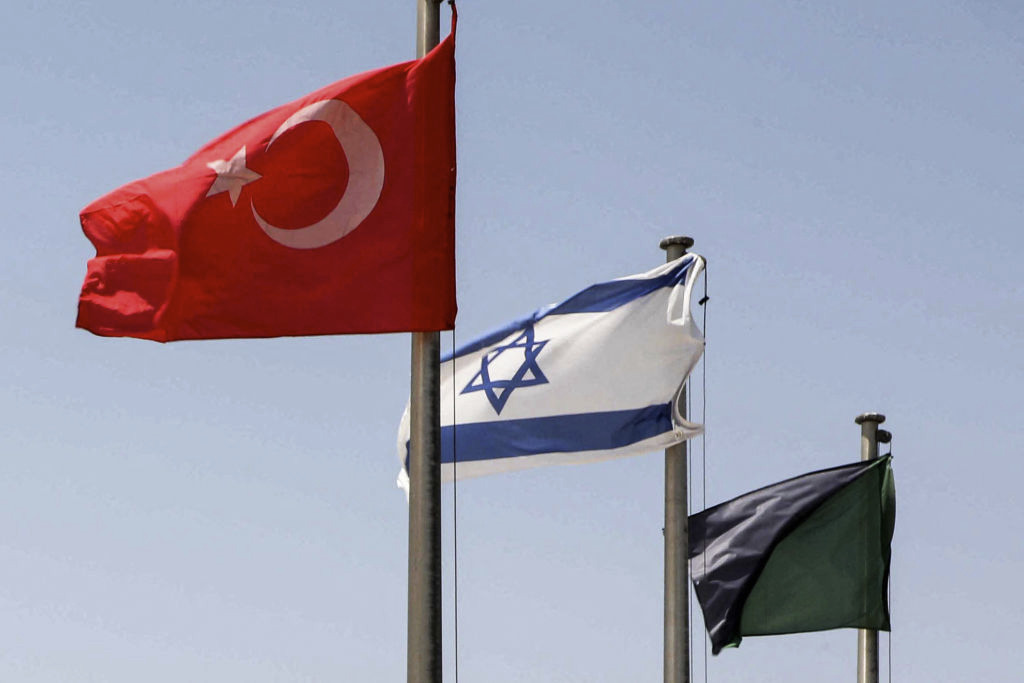
Blessed are the peacemakers: it sounds so nice that Turkey and Israel have decided to be friends again. After a four-year hostile chill in relations has thawed gradually in recent months, the former allies have agreed to restore full diplomatic relations, exchanging ambassadors. Nice? Very nice! Champagne to celebrate the peace? Sloooow down.
It has been more than a decade since Turkey and Israel, once strategic partners, broke up badly, with an angry Ankara vowing to isolate Israel internationally. It has also been more than five years since the two countries decided to "give peace a chance" once more and appointed ambassadors. The envoys had to pack up and leave after 17 months of trying to put things back together again.
Israel is normalizing diplomatic relations with a country whose unchallenged leader for the past two decades once described Zionism as a crime against humanity. Turkish President Recep Tayyip Erdoğan's political formation was based on a militant expanse of anti-Zionism as a raison d'être. Erdoğan is just as anti-Israeli today as he was 40, 30, 20 and 10 years ago.
In a 2015 study, the Anti-Defamation League found that 35 million out of an adult population of 49 million Turks, or 71%, harbored antisemitic attitudes, compared to an average 49% in the entire Muslim world. Just 15 months ago, in May 2021, Erdoğan, referring to Jewish people, said: "It is in their disposition that they are only satisfied by sucking blood." Part of Erdoğan's rage has also been directed at U.S. President Joe Biden. "Today we have witnessed Biden's approval of weapons [sales] to Israel. You [Biden] are writing history with bloody hands." Erdoğan's remarks came as the Biden administration approved the potential sale of $735 million in precision-guided munitions to Israel.
There is too much evidence unmasking Erdoğan's fake peace with the Jewish state. In particular, one incident eclipses all others. In September 2020, Erdoğan threatened to reduce diplomatic ties with the United Arab Emirates (UAE) after the Gulf state made peace with Israel. Erdoğan accused the UAE of "betraying the Palestinian cause." That was just silly: Turkey has had diplomatic relations with Israel since 1949. Now, with his peace initiative, Erdoğan appears to be even more hypocritical: Is Turkey now "betraying the Palestinian cause" by restoring full diplomatic relations with Israel?
No, Erdoğan protested as he hosted Palestinian Authority President Mahmoud Abbas in Ankara. Erdoğan said that the decision to upgrade ties with Israel "will in no way diminish our support for the Palestinian cause." That was a message for many wavelengths.
To Jerusalem: I will deal less with Hamas and more with Abbas.
To Hamas: I will deal with you covertly. My ideological love for you is eternal. But our love affair must remain a secret.
To the Turks: I am not betraying the Palestinians. See how I appreciate Abbas? (For Turks, Palestinians are Palestinians, whether Hamas or Abbas.)
Erdoğan's peace with Israel is not peace. It is a tactical move to flash to Washington: I am being a good boy, give me the F-16s, do not sanction me as further sanctions may terminate my rule at the ballot box next year. Turkey's official annual inflation rate running at 80%, with one US dollar trading at 18 Turkish liras, per capita income at $8,000, poverty, high unemployment. Erdoğan's chances for re-election in June 2023 are getting slimmer every day.
This will be a fragile peace effort between the most important U.S. ally in the Middle East and an unreliable NATO member. In his election campaign next year, Erdoğan will resort, once again, to his pro-Hamas, "champion-of-the-Palestinian-cause" rhetoric to win a few more votes.
Ankara and Jerusalem have not yet announced (as of August 30) who their new ambassadors will be. Whoever they will be, they should keep a bag packed for a fast departure.
Burak Bekdil, one of Turkey's leading journalists, was recently fired from the country's most noted newspaper after 29 years, for writing in Gatestone what is taking place in Turkey. He is a Fellow at the Middle East Forum.


